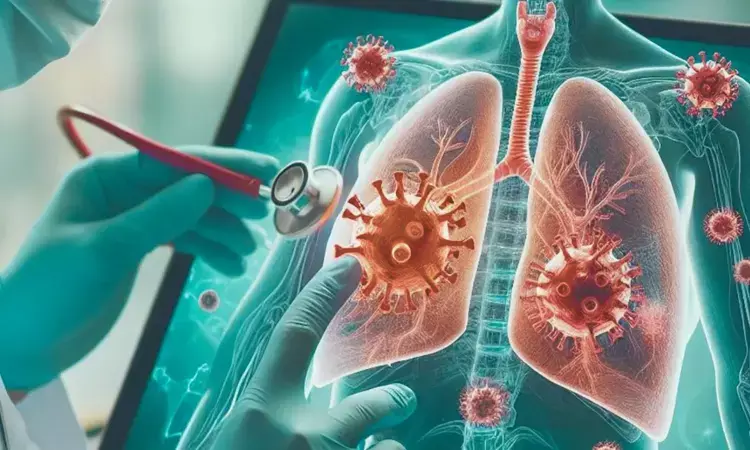- Home
- Medical news & Guidelines
- Anesthesiology
- Cardiology and CTVS
- Critical Care
- Dentistry
- Dermatology
- Diabetes and Endocrinology
- ENT
- Gastroenterology
- Medicine
- Nephrology
- Neurology
- Obstretics-Gynaecology
- Oncology
- Ophthalmology
- Orthopaedics
- Pediatrics-Neonatology
- Psychiatry
- Pulmonology
- Radiology
- Surgery
- Urology
- Laboratory Medicine
- Diet
- Nursing
- Paramedical
- Physiotherapy
- Health news
- Fact Check
- Bone Health Fact Check
- Brain Health Fact Check
- Cancer Related Fact Check
- Child Care Fact Check
- Dental and oral health fact check
- Diabetes and metabolic health fact check
- Diet and Nutrition Fact Check
- Eye and ENT Care Fact Check
- Fitness fact check
- Gut health fact check
- Heart health fact check
- Kidney health fact check
- Medical education fact check
- Men's health fact check
- Respiratory fact check
- Skin and hair care fact check
- Vaccine and Immunization fact check
- Women's health fact check
- AYUSH
- State News
- Andaman and Nicobar Islands
- Andhra Pradesh
- Arunachal Pradesh
- Assam
- Bihar
- Chandigarh
- Chattisgarh
- Dadra and Nagar Haveli
- Daman and Diu
- Delhi
- Goa
- Gujarat
- Haryana
- Himachal Pradesh
- Jammu & Kashmir
- Jharkhand
- Karnataka
- Kerala
- Ladakh
- Lakshadweep
- Madhya Pradesh
- Maharashtra
- Manipur
- Meghalaya
- Mizoram
- Nagaland
- Odisha
- Puducherry
- Punjab
- Rajasthan
- Sikkim
- Tamil Nadu
- Telangana
- Tripura
- Uttar Pradesh
- Uttrakhand
- West Bengal
- Medical Education
- Industry
Metagenomic Next-Generation Sequencing Enhances Diagnosis and Treatment of Lower Respiratory Tract Infections: Study

China: A recent study has highlighted the clinical utility of metagenomic next-generation sequencing (mNGS) for diagnosing lower respiratory tract infections (LRTIs), showcasing its potential to significantly improve diagnostic accuracy and patient outcomes.
Recent research published in BMC Pulmonary Medicine shows that metagenomic next-generation sequencing achieved an 81.29% pathogen detection rate compared to 39.35% with traditional cultures.
"While mNGS demonstrated superior sensitivity (88.41% versus 43.48%) and somewhat lower specificity (76.47% versus 94.12%), it effectively contributed to 77.54% of lower respiratory tract infection (LRTI) diagnoses and directly influenced treatment decisions in 37.42% of cases, leading to optimized antibiotic use," the researchers reported.
Lower respiratory tract infections, which include conditions such as pneumonia, bronchitis, and chronic obstructive pulmonary disease exacerbations, present significant challenges in clinical settings. Accurate and timely identification of the causative pathogens is crucial for effective treatment, yet conventional diagnostic techniques often fall short in sensitivity and breadth, leading to suboptimal treatment outcomes.
Against the above background, Hongtao Chen, Department of Clinical Laboratory, The Fifth Affiliated Hospital of Sun Yat-sen University, Zhuhai, Guangdong, China, and colleagues aimed to evaluate the clinical utility of mNGS on bronchoalveolar lavage fluid (BALF) in the diagnosis of Lower Respiratory Tract Infections.
For this purpose, the researchers retrospectively analyzed 186 hospitalized patients suspected of having lower respiratory tract infections (LRTIs) at The Fifth Affiliated Hospital of Sun Yat-sen University. The study, which took place from March 2023 to August 2023, involved performing metagenomic next-generation sequencing (mNGS) using DNA tests on bronchoalveolar lavage fluid (BALF) samples.
Suspected LRTIs were identified based on clinical manifestations or imaging findings. Of the 155 patients who underwent conventional culture and mNGS testing, 138 cases (89.03%) were confirmed as LRTI, while 10.97% of cases were determined to be non-LRTI. The study compared the detection rates and diagnostic efficacy of mNGS and conventional culture methods.
The researchers reported the following findings:
- The positive detection rates of pathogens between mNGS and conventional culture were significantly different (81.29% versus 39.35%).
- Compared with paired conventional culture results, the sensitivity of mNGS in LRTI diagnosis was superior (88.41% versus 43.48%), and the specificity was the opposite (76.47% versus 94.12%).
- 77.54% and 35.51% of LRTI cases were being etiologically diagnosed by mNGS and culture respectively. Importantly, mNGS directly led to a change of treatment regimen in 37.42% of cases, including antibiotic adjustment (29.68%) and ruling out active infection (7.74%).
- The treatment regimen remained unchanged in 62.58% of cases, considering the current antibiotic therapy already covered the detected pathogens (36.13%) or empirical treatment was effective (11.61%).
"Metagenomic next-generation sequencing can detect a broad spectrum of pathogens in lower respiratory tract infections, offering enhanced sensitivity and superior diagnostic accuracy for identifying the causes of LRTIs," the researchers wrote.
"By providing a more comprehensive pathogen profile, mNGS has the potential to improve clinical outcomes through better-tailored treatment regimens," they concluded.
Reference:
Zheng, Y., Liu, W., Xiao, T. et al. Clinical utility of metagenomic next-generation sequencing on bronchoalveolar lavage fluid in diagnosis of lower respiratory tract infections. BMC Pulm Med 24, 422 (2024). https://doi.org/10.1186/s12890-024-03237-w
Dr Kamal Kant Kohli-MBBS, DTCD- a chest specialist with more than 30 years of practice and a flair for writing clinical articles, Dr Kamal Kant Kohli joined Medical Dialogues as a Chief Editor of Medical News. Besides writing articles, as an editor, he proofreads and verifies all the medical content published on Medical Dialogues including those coming from journals, studies,medical conferences,guidelines etc. Email: drkohli@medicaldialogues.in. Contact no. 011-43720751


